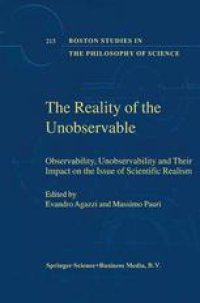
Ebook: The Reality of the Unobservable: Observability, Unobservability and Their Impact on the Issue of Scientific Realism
- Tags: Philosophy of Science, Epistemology, Quantum Physics, Artificial Intelligence (incl. Robotics), Classical and Quantum Gravitation Relativity Theory
- Series: Boston Studies in the Philosophy of Science 215
- Year: 2000
- Publisher: Springer Netherlands
- Edition: 1
- Language: English
- pdf
Observability and Scientific Realism It is commonly thought that the birth of modern natural science was made possible by an intellectual shift from a mainly abstract and specuJative conception of the world to a carefully elaborated image based on observations. There is some grain of truth in this claim, but this grain depends very much on what one takes observation to be. In the philosophy of science of our century, observation has been practically equated with sense perception. This is understandable if we think of the attitude of radical empiricism that inspired Ernst Mach and the philosophers of the Vienna Circle, who powerfully influenced our century's philosophy of science. However, this was not the atti tude of the f ounders of modern science: Galileo, f or example, expressed in a f amous passage of the Assayer the conviction that perceptual features of the world are merely subjective, and are produced in the 'anima!' by the motion and impacts of unobservable particles that are endowed uniquely with mathematically expressible properties, and which are therefore the real features of the world. Moreover, on other occasions, when defending the Copernican theory, he explicitly remarked that in admitting that the Sun is static and the Earth turns on its own axis, 'reason must do violence to the sense' , and that it is thanks to this violence that one can know the tme constitution of the universe.
The debate on realism in physics is usually focused on the reality of unobservable entities admitted in physical theories. This reality has been often denied (e.g., by Bas van Fraassen). The present book shows that observability is a very complex notion that does not really have direct implications on ontological issues related to the existence of the non-observable entities. This is shown through historical, philosophical and scientific considerations presented in the different parts of the book. Emphasis is also given to the role of experiments, measurement procedures and computer-analyzed data as interface between the theoretical and experimental cultures.
The debate on realism in physics is usually focused on the reality of unobservable entities admitted in physical theories. This reality has been often denied (e.g., by Bas van Fraassen). The present book shows that observability is a very complex notion that does not really have direct implications on ontological issues related to the existence of the non-observable entities. This is shown through historical, philosophical and scientific considerations presented in the different parts of the book. Emphasis is also given to the role of experiments, measurement procedures and computer-analyzed data as interface between the theoretical and experimental cultures.
Content:
Front Matter....Pages i-vii
Introduction....Pages 1-29
The Origin of Scientific Realism: Boltzmann, Planck, Einstein....Pages 31-44
Observability and Referentiality....Pages 45-57
A New Approach to Human Cognition and its Significance for the Philosophy of Science....Pages 59-85
Abduction and Non-Observability....Pages 87-112
‘Scientific Realism’ and Scientific Practice....Pages 113-122
Random Philosophy....Pages 123-128
Formal Representation and the Subjective Side of Scientific Realism....Pages 129-135
Convention and Observability....Pages 137-144
Scientific Realism, Objectivity, and ‘Technological Realism’....Pages 145-151
Testability and Empiricism....Pages 153-164
Observing the Unobservable....Pages 165-175
What does it Mean to Observe Physical Reality?....Pages 177-190
Realism, and the Case of Rival Theories without Observable Differences....Pages 191-206
Measurability, Computability and the Existence of Theoretical Entities....Pages 207-217
Observation, Construction and Speculation in Cosmology....Pages 219-229
Where Did the Notion that Forces are Unobservable Come from?....Pages 231-239
Quantum Mechanics without the Observables....Pages 241-249
Observation, Contextuality, and Realism....Pages 251-255
Efficient and Final Cause as CPT Reciprocals....Pages 257-282
Observability and Realism in Modern Experiments with Correlated Quantum Systems....Pages 283-291
Quantum Mechanics, Realism and the Ultimate Observer....Pages 293-310
Individualistic and Statistical Interpretation of Quantum Mechanics....Pages 311-316
How to Observe Quarks....Pages 317-327
Common Experience and Quantum Theory....Pages 329-341
On the Relationships between Classical and Quantum Mechanics....Pages 343-351
Back Matter....Pages 353-359
....Pages 361-377